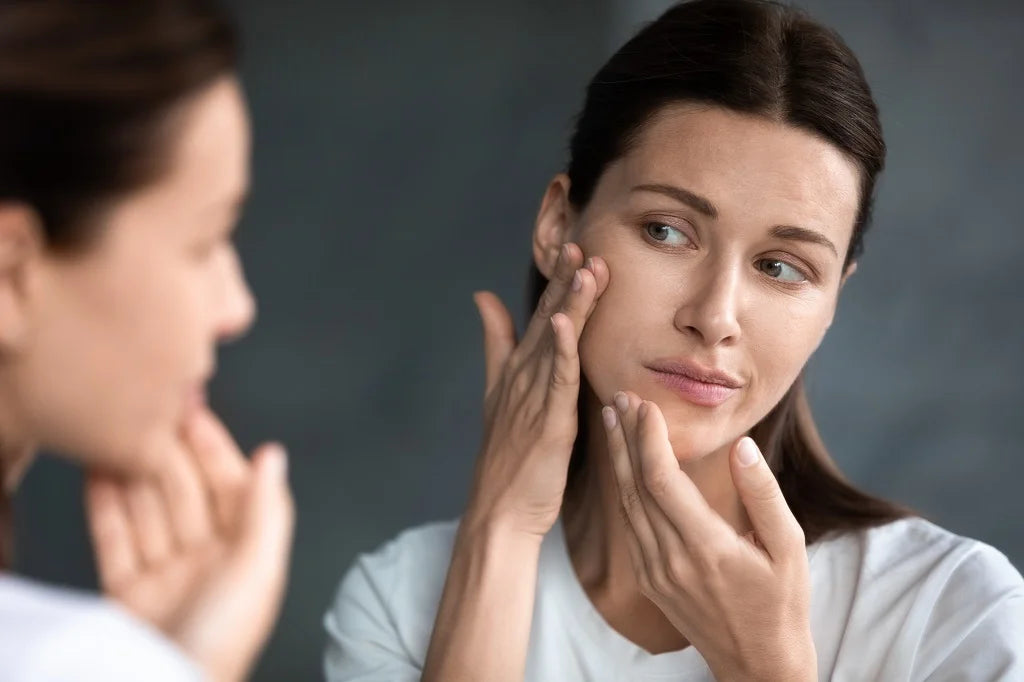
Skin Blemishes - Types And How To Get Rid Of Them

Dr. Deepthi Prasad, MBBS.
Written by Our Editorial Team
Allergies, sun damage, and pollution can negatively impact your skin, resulting in acne, pimple, hyperpigmentation, scars and blemishes. Blemishes are stubborn, like belly fat that refuses to go away easily. Blemishes can prevent you from having flawless, radiant skin. The sight of blemishes on the face can be tormenting for many people. No worries! Numerous skincare treatments and home remedies are available to fade skin blemishes and scars that shake your confidence. In this blog, we will share all the information you need to know about skin blemishes.
What Are Blemishes?
A blemish can be any skin discoloration, mark, spot or flaw. Although blemishes on the face can be distressing and upsetting for many, most of it will fade away by following the proper skincare regime. However, some blemishes can indicate serious skin conditions.
You can reduce the appearance of blemishes by undergoing skin treatment or using home remedies.
Read on to learn different types of blemishes, their causes and treatment methods.
Types Of Blemishes

Now that you are aware of blemishes, to understand your skin, you should be aware of the different types of blemishes.
1. Acne
Acne is the most prevalent skin condition. This condition can be categorized into pimples, whiteheads or blackheads. This is caused when the skin's pores get clogged with dirt, sebum and bacteria. Changes in the hormone can also lead to acne, which is why most people experience acne and pimple in their adolescence. Acne can lead to skin discoloration or scarring if it isn't treated.
Also Read : Debunking Acne Myths: 10 Things You Need to Stop Believing if You Want to Clear Your Acne
2. Skin Lesions
Acne isn't the only reason for skin bumps and lesions. Other causes include rashes, eczema, dermatitis, chickenpox, and dermatitis. Also, psoriasis and shingles can cause lesions (papules). This type of skin condition generally occurs in clusters.
3. Discoloration
There are many types of skin discoloration. Age spots are dark spots that appear in people older than 50 years. They are formed from prolonged exposure to the sun. Birthmarks are skin discoloration that you find at the time of birth. These marks can vary in size, color and shape. Some markings will fade with time, while others can last a lifetime. Melasma can be caused by hormonal changes, particularly during pregnancy. As hormone levels return to normal, these brownish spots will disappear.
4. Scars
Scarring occurs when the skin's outermost layer is damaged. Deep cuts, bruises or stretching of the skin due to pregnancy or sudden weight gain is known to cause scarring. Almost anything that opens up the skin, such as a cut, or wound, can leave a scar.
5. Nodules
Nodules are formed when the skin tissues get collected at a particular place. Skin tags and warts are typical examples of nodules. They are similar to the skin in color but have a reddish tinge.
6. Ingrown Hairs
Although ingrown hairs can sometimes occur naturally. They are usually caused by waxing, tweezing or shaving. Curly haired people are more likely to experience ingrown hairs. Hair can become trapped in the hair follicle when it grows back into it. This results in ingrown hairs. Ingrown hairs can cause severe pain and even cyst formation.
7. Cysts
Cysts are bumpy structures formed on the skin that have fluid filled with a typically benign substance. The most common types are epidermoid, sebaceous, and ganglion. The herpes virus can cause cold sores. To prevent further complications, it is important to keep cysts under control.
What Causes Skin Blemishes?
Infections, genetics, viruses, and exposure to the sun for long durations can cause skin discoloration, rashes, bumps and other skin imperfections. Reaction to certain medications, such as corticosteroids or antiseizure drugs, can cause an allergic reaction to your skin. Medications that affect the hormone level can also cause skin blemishes. You can often prevent these skin conditions by following a regular skincare routine and a proper diet. But you may need to consult a dermatologist and seek skin treatment for treating certain types of skin blemishes.
How To Get Rid Of Skin Blemishes?

Knowing the type of blemish and its cause is vital before seeking treatment. Several treatment options are available for blemishes. Sometimes identifying the cause of the problem and then treating it appropriately is recommended by dermatologists.
1. Following a Regular Skincare Routine
Maintaining skin hygiene is vital for having problem-free skin. Following a regular skincare routine will help. It would help if you started your morning skincare routine with Cleanser- Use Super Hydrating Foaming Facial Cleanser, Toner- Use Pore Minimizing Ultimate Toner, Exfoliation (once or twice a week), Moisturizer, followed by sunscreen-Ultra Light Daily Sunscreen Gel. Applying facial serum, specially formulated to target hyperpigmentation, can help reduce scars and blemishes. Our Radiance Serum is infused with skin-brightening ingredients such as radiance complex, revolutionary ingredient - Cywhite and niacinamide which evens out your skin tone, improving the texture and appearance of your skin. Applying the Radiance Serum twice a day will help fade away dark spots and pigmentation, giving you clean and clear skin.
Also Read : How Does Cywhite Help In Skin Brightening?
Buy ThriveCo Super Hydrating Foaming Facial Cleanser
Buy ThriveCo Pore Minimizing Ultimate Toner
Buy ThriveCo Radiance Serum
Also Read : Pick This One Facial Serum That Does It All This Holiday Season
2. Hydrocortisone Cream
You may apply Hydrocortisone cream to relieve itching caused by an allergic reaction. The dermatologist recommends hydrocortisone creams for reducing skin inflammation and rashes. Follow the instructions on the packaging. Talk to your doctor if you don't see relief within a few days or if the condition worsens.
3. Dermatologic Treatment
Dermatologic treatments such as chemical peels, microdermabrasion and laser therapy are recommended for treating stubborn scars and blemishes such as acne, age spots and sun-damaged skin. Consult a dermatologist to know which skin treatment will be effective for your skin condition.
Nowadays, adequate skin treatments are available for treating various skin imperfections. Sometimes, blemishes on the face can be a nuisance and a reason for discomfort. Consult your doctor if you notice bleeding, a change of color or size. These signs can indicate a more serious condition. Some infections cannot be treated without prescriptions and may require medical attention.
About Doctor :

Dr. Deepthi Prasad specializes in Dermatology, Cosmetology, and Aesthetic Dermatology and has been practicing for over 15 years. After completing MBBS from Dr. NTR University of Health Sciences Andhra Pradesh in 2009, she earned a MD in Dermatology, Venereology & Leprosy from Osmania Medical College in Hyderabad in 2014.
Disclaimer: All the content published on www.thriveco.in is solely for information purposes. It is not a substitute for professional medical advice, diagnosis, or treatment. Always consider seeking the advice of your physician or a qualified healthcare provider. The information, suggestion, or remedies mentioned on this site are provided without warranty of any kind, whether express or implied.





 Buy 1 Get 1 Free. Use Code: BOGO
Buy 1 Get 1 Free. Use Code: BOGO






